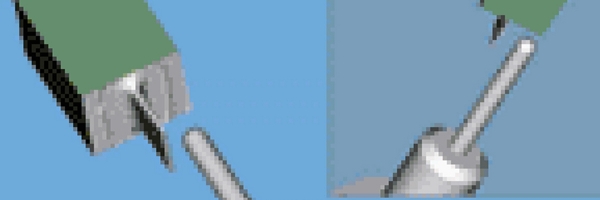Delivering on a Commitment – Manufacturing at Minco Tool & Mold, Inc.
The mold making business is challenging, competitive, and often time’s unpredictable. In this environment, it is not uncommon for manufacturers to miss deadlines do to unforeseen production delays. Since 1954, Minco Tool & Mold, Inc. has prided itself in committing to and meeting the best possible delivery dates for its customers.
Minco Tool & Mold, Inc. and ASPM (All Service Plastic Molding, Inc.) comprise the Minco Group, which provides full-service mold building and part production programs. Minco Tool & Mold employs 170 people and specializes in molds for business equipment, automotive products, medical instruments, and consumer products.
Minco’s 14 CNC machines run 24 hours a day, seven days a week. In order meet their commitment of the best possible turn-around time, the manufacturing department utilizes the latest NC manufacturing software technology. By doing so, Minco’s 15 programmers and 24 CNC machinists are able to streamline the manufacturing process and eliminate errors that cost valuable time. One of the company’s most useful tools for this purpose is VERICUT from CGTech. VERICUT checks the accuracy of an NC tool path so manufacturing engineers can detect and correct problems before sending the NC part program to the shop floor.
“VERICUT’s integration into Unigraphics software is key to our successful use of the product,” said Jon Allen at the company’s research & development department. By using VERICUT to verify their tool paths created in Unigraphics, Minco has been able to eliminate the need to proof NC programs at the machine. This saves a great deal of time and helps the company to make good on its promise of on-time delivery. “Not only have we greatly reduced the amount of error at the machine, we’ve eliminated the need to proof programs at the machine. We do all our prove-outs on the computer, and that keeps our machines open for production work. We’re a much more efficient operation as a result,” says Allen.
ecause deadlines are often tight and the company prides itself on on-time delivery, Minco also takes advantage of VERICUT’s FastMill module. This enables them to verify part programs in a highly accelerated mode and save even more time. “We use the FastMill module mainly on electrodes where watching material removal is not as important as viewing the final form,” says Allen.
That’s not the only way engineers at Minco are taking advantage of verification technology to ahead of the competition. They have also developed their own unique applications for the software and its ‘automatic differencing’ capability. Basically, they use VERICUT to compare a rough mold cavity with an electrode file to determine if there has been too much or too little burn. First, solid models are created of all electrodes required for a given part using Unigraphics software. Then, the modeled electrodes are brought in as a design solid and compared to a cut stock model of the part. “This not only ensures the electrodes are modeled correctly (with proper clearances, etc.),” says Allen, “but also allows us to make sure we get the electrodes set up for all necessary areas.” Then, VERICUT is used to compare the cut models to the design solid of the finished electrode. “Using VERICUT to compare the electrode burn with the mold cavity ensures that we have all the correct clearances in the electrodes and that we have 100% clean-up.” says Allen.
A recent job serves as a perfect example. Minco was contracted by a company outside the United States to build the molds for a new traffic light system. Some of the parts had to be made under an extremely tight schedule that didn’t leave room for any errors or delays. Additionally, due to the type of materials to be used for the final product, the finish quality of the mold tooling had to be outstanding. Often in mold work, small mistakes can be fixed with welds. “This job required extra care,” said Allen. ” Sometimes you can give a mold part a mirror finish that looks perfect to the eye, but small imperfections can still show up on the final product. On this project we couldn’t afford to leave even the smallest insert lines within the cavity area.”
The programmers at Minco ran every electrode tool path through VERICUT. By using the program to compare the machined electrode with the original design model, the programmers at Minco were able to determine that the electrode tool paths had just the right amount of burn and did not gouge the part or leave excess material behind. Using the software, they were able to ensure that there would be no mistakes or delays when machining the mold parts for the traffic light system. Minco easily completed the project by the scheduled date, despite the tight time deadline and the stringent machining requirements.
Minco also uses VERICUT as a research and development tool to help evaluate run times of various cutting methods in order to determine the best approach to a certain situation. And, VERICUT has been a valuable tool as the company has moved into the arena of high-speed machining. “We’ve used VERICUT extensively to support our move into using high-speed milling techniques to process our components,” says Allen.
Utilizing available manufacturing technologies such as VERICUT has helped Minco achieve a high level of success. “The ability to export solid models from our CAM system into VERICUT for comparative analysis is extremely significant,” says Allen. “We pride ourselves on being a high-tech operation and using the latest tools and techniques to give our customers the best products in the best time. And the bottom line is that VERICUT has enabled us to speed production, reduce costs along the way, and improve the quality of our products.”
 Germany
Germany Italy
Italy USA
USA South Korea
South Korea UK
UK India
India France
France China
China Japan
Japan
